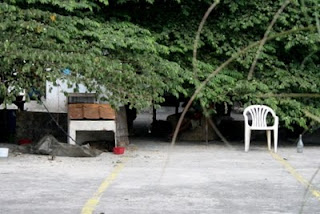 Filipina helpers take a day off.
Filipina helpers take a day off.
We've had this discussion before. The mass gathering of Filipina domestic helpers in Hong Kong every Sunday is a constant source of shame, amazement, and interest-- an array of reactions from diversely inclined Manileños.
Marisa González, a Spanish artist and documentarist, has created
Ellas Filipinas (The Filipinas), recently exhibited at
This Is Not A Gateway in London. The video chronicles the weekly horde of Filipina workers at the open spaces of Hong Kong (particularly the HSBC bank), and how on every Sunday, the said place is transformed into a "small town" (according to
Alexander Trevi), "somewhat autonomous from the city and with its own parallel economy of exchange and transactions". See the trailer
here.
Local reactions to the weekly phenomena depend on personal definitions of public space, largely arising from social background. Wealthier Filipinos puke a little bit in their mouths when they see public pedicures (which are actually quite common), out of place in their ideas of hygiene and gated-subdivision-style privacy. They are mortified by the conundrum of domestic helpers in Hong Kong-- they cannot afford their own property, and they are not ashamed to create their own, even just for a day. Both the visual impact and the scope of public activity is protested by the more "couth" populace.
 Streetside lice-picking.
Streetside lice-picking.
But those who live in urban and peri-urban settings are familiar with a fluid deliniation between what is public and private, with the bounds similar to those in a very rural
bahay kubo setup. The home is used for sleeping, while cooking, handwork, and even showering takes place in public or semi-public locations (e.g. "dirty" kitchen and the outhouse). In the cities, cooking and bathing have been relocated inside the home, but even to this there are exceptions-- large-scale cooking is done outside due to space constraints, and I have seen not a few grilling sessions and
showers along the street (some washing their clothes, and then deciding to wash themselves as well). Activities like haircuts, lice-picking, tattooing, are best done where light and space are abundant, and this means, outside your door (urban abodes can be extremely cramped, hot, and dark).
 Mani-pedi in a public market (reposted).
Mani-pedi in a public market (reposted).
In a country where you can, for the most part, begin to sell various dry goods outside your house or on a busy street corner if you wish, there is also less hesitation to define a space as one sees fit. In one "dead" corner near my home (which is not in a subdivision), there is a constant bingo operation going on where the women gamble loudly whilst squatting on the floor, their cards splayed out in front of them. In other moments, it becomes a small basketball court, with the ring and board tacked onto an electrical post. On some nights, it becomes a
garahe for a school bus. Once in awhile, trumping all other uses in urgency, the patch of concrete houses garish lights, a red carpet, and a coffin, for a rent-free funeral wake (for the coffins would fit into none of the homes around). People define and change utility of this "public" plot without hesitation.
 Outdoor living room, under an aratiles tree.
Outdoor living room, under an aratiles tree.
And so, there is much opportunity to create a space that defines "non-work", for employees that need to. Domestic helpers back here in the Philippines also often take Sundays off. Being mostly regional migrants, they have no home to come home to in the metropolis, but must leave their employers' home to define the day as, well, a day off. Within the household, the work hours are arbitrary, and the maid's quarters are not defined as a "home" per se-- for usually, so long as the maid is in, she is on call. Staying in on a Sunday, unless you are sick, means volunteering your services for one extra day, or witnessing the ire of your boss as they do the dishes while you read a romance novel.
One helper recounts to me her growing closeness to a cousin, whose home had become the Sunday hangout for distant relatives making a living in Metro Manila. It was there that they received news from their small town in Bicol, traded stories on their employers, and gave money to one person who placed their lotto bets while they were at work all week. You can imagine, in a country with no distant relations with property, how Filipinas cope.
Constantly surrounded by people who are unlike them, who don't even take the effort to know their family names or interests, who don't share the same language and symbols, they need one day of ease, or at least a replacement for their local concept of home and/or common space. On Sundays, their identity resumes.





